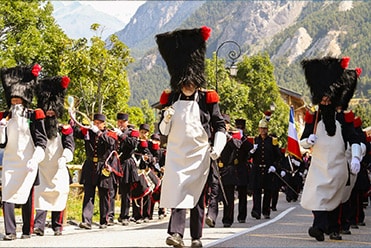That morning, the Modane to Mont-Cenis courier was about to arrive in sight of Bramans when the driver suddenly stopped his horses and jumped out of his seat. He had just seen a man lying lifeless across the road. He approached and recognized one of his compatriots, a wealthy horse dealer from Bramans.
The wounded man was moaning plaintively and seemed unable to move. He had undoubtedly been assaulted by brigands, for he bore a large head wound, his clothes were in disarray and his wallet lay empty beside him. With great care, the driver relieved him and placed him in the carriage; then he quickly resumed his journey towards Bramans. When he reached the village of Verney, he deposited the wounded man at the "Lion d'or" hotel and called his family, who rushed to the scene, soon followed by the syndic (mayor at the time), the brigadier, the carabinieri and a few neighbors and friends.
While waiting for the doctor to arrive, the brigadier tried to get some information.
- Who attacked you?" he asked.
The casualty seemed to make an extreme effort, then in a breath, he let out:
- Les Grands Chapeaux.
No sooner had this answer left his lips than a shudder ran through the assembly. The syndic paled, the brigadier bowed his head, and as if under the influence of a magical power, neighbors and friends quickly and stealthily disappeared.
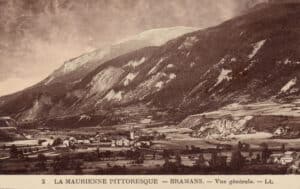
The year was 1816, and Savoy was part of the Kingdom of Piedmont-Sardinia. Although the Napoleonic Wars had just ended, there was still no peace in Bramans (which was not yet part of Val Cenis). The village even lived under a kind of terror: robberies, assaults and murders were frequent. Travelers who lingered along the way were inevitably robbed and even mercilessly put to death if they tried to resist.
No one dared go out at night. The carabinieri were on the alert, redoubling their efforts to discover the criminals, but to no avail, as those who could have guided their search remained silent, for fear of incurring reprisals they knew would be terrible.
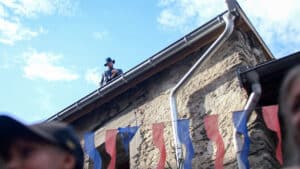
The Revolution was over, but the scars of war had not yet healed. When the armies broke up, they left behind a trail of sinister debris: demobilized soldiers unable to return to civilian life, and mercenaries in search of booty or adventure. Having fought and shed blood all over Europe, some of these men had kept their weapons and "reconverted" to brigandage... A gang had thus formed in the vicinity of Bramans.
An organized gang led by a bold and cruel leader
There were 14 of them, forming an organized gang under the direction of a bold and cruel leader. On their criminal expeditions, they wore as a sign of distinction a large black felt hat, a sort of sombrero with wide, folded-down brim, which hid part of their face, hence the name "the Big Hats". They were so feared that people didn't even dare speak of them, and the mere mention of their name was enough to instill fear and dread.
This explains why the wounded man's neighbors and friends fled in such haste when he named his assailants. The cripple was left alone with his family and the parish priest, who had come to bring him religious help. Despite the care he received, he died that evening.
A living legend re-enacted every August 15 in Bramans

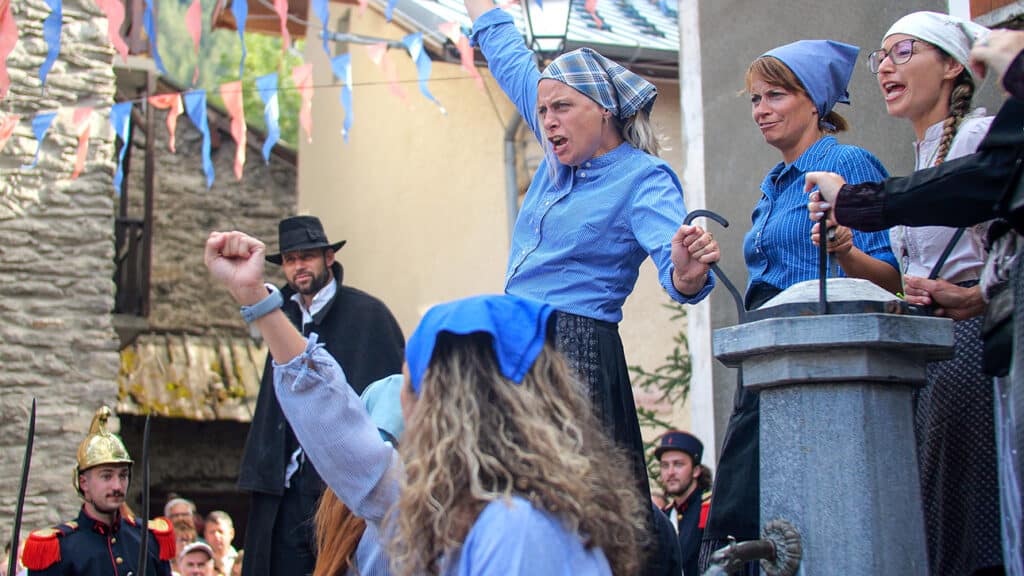
Back in his presbytery, the parish priest reflected sadly on the misfortunes that had just befallen his parish. He had only been in Bramans a few weeks, and already two murders had been committed: the last, that of the maquignon, and the previous, that of his sacristan, found dead in the bell tower and for whom he had fortunately found a volunteer successor. He suffered at the thought of seeing his parishioners exposed to the terrible attacks of the "Great Hats", and he begged the Lord to keep this terrible scourge away from them. And as he pondered and prayed, the doorbell rang.
- Monsieur le curé," called his housekeeper, "it's a Capuchin priest asking for you.
The priest stepped forward to meet the visitor.
- Excuse me, Monsieur le Cure, for disturbing you at this hour. I'm from the convent in Châtillon. My superiors sent me to beg in the Maurienne, and as it was getting dark, I took the liberty of coming to ask for your hospitality.
- Welcome, Father, I'm delighted to have this opportunity to please a son of Saint Francis. Come in and share my modest meal with me. Jeanne, you will prepare the first floor bedroom.
A few moments later, we sat down to dinner. Naturally, the conversation turned to the event of the day: the murder of the horse dealer.
- Aren't you afraid, Monsieur le curé, of being attacked by these brigands? Your presbytery is quite isolated, and it's in vain that you'd call for help - no one would hear you.
The Bramans presbytery is far from any habitation, perched on a mound that it shares with its church and cemetery.
- I know," replied the priest, "but I hope God will protect me. Is this your first visit to this region, Father?
- Yes, Monsieur le curé, and as I passed through Sardières, I admired the famous rock that stands like a giant needle in the middle of the forest.
- Yes, it's a splendid 93-metre-high monolith.
- And is this "modolite" in one piece?
The priest couldn't answer on the spot, so strange did this question and the distortion of the word seem to him, coming from a scholar. A monolith is either made of a single stone or it's not a monolith at all. And he felt a kind of anguish set in. However, he quickly pulled himself together and was able to finish his meal without the slightest hint of embarrassment.
As the hour wore on, the capuchin asked to be excused. The parish priest hurried him into the room that had been prepared for him, then retraced his steps. As he passed the kitchen, he saw the maid waving at him in fear:
- Monsieur le curé! Monsieur le curé! We're lost! This monk isn't a Capuchin. Earlier, when I picked up the cutlery that had fallen under the table, I noticed he was wearing boots. I've seen capuchins with sandals or shoes, but never with boots! Maybe it's one of the Great Hats... Lord, we're lost!
- Don't worry so, Jeanne, lock yourself in if you're afraid, but don't worry about me, nothing will happen to me without God's permission.
The parish priest must have been less reassured than he let on, for he immediately went to check the parish church's alarm signal. This signal consisted of a system of levers and iron rods which, from inside the presbytery, activated a bell in the belfry, thus alerting the population. To his astonishment, he found that the signal was no longer working, and that one of the outer rods had been severed. This incident gave him pause for thought, but did not change his state of mind. He quietly went to his bedroom, forgetting even to lock the door, and prayed himself to sleep. A few moments later, all was still and silent in the retreat. All that could be heard was the ticking of the hall clock.
And then, around midnight, a figure stepped into the ground-floor corridor. He wasn't wearing the capuchin habit, but he was wearing the famous hat. He entered the staircase leading to the upper floor, strolled up, paused at each step, listened for a few seconds, then continued on his way. Finally, he reached the first floor and, knowing the layout of the rooms, headed straight for the priest's bedroom. He opened the door slowly, very slowly, took a few steps towards the bed, then suddenly raised his arm and with all his might thrust a long dagger into the chest of the mannequin with which the priest had replaced himself. At the same moment, two strong hands came down on the bandit and squeezed his neck as if in a vice. He struggled to his feet, but his movements had no effect other than to tear off the false beard with which he was disguised. He tried to free himself, but to no avail. The embrace didn't weaken; on the contrary, it tightened until it shattered his vertebrae.
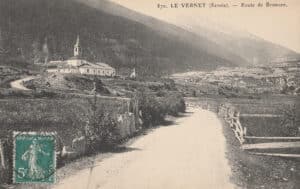
Although he was acting in self-defense, the priest had no intention of killing his assailant; he simply wanted to reduce him to impotence. But under the nervous tension and emotion of this tragic scene unfolding in the darkness, he didn't realize that he was exceeding his intention. When he opened his hands again, the murderer crumpled to the floor. Just then, the priest heard a voice whispering under his window:
- I think this is it.
He opened the door and caught a vague glimpse of three men in large hats. He shuddered to think of the new danger threatening him.
- Is it done?
- Yes," he replied in a dead voice.
- Then throw away his corpse.
The priest realized that if he hesitated, he was doomed. He rolled the inert body in a sheet and tipped it out of the window. Then he heard the footsteps of the bandits as they quickly disappeared, on their way to bury the man they believed to be the parish priest, who was in fact the false Capuchin.
Finally, free of himself, the poor priest threw himself on his prie-Dieu, where he spent the rest of the night.
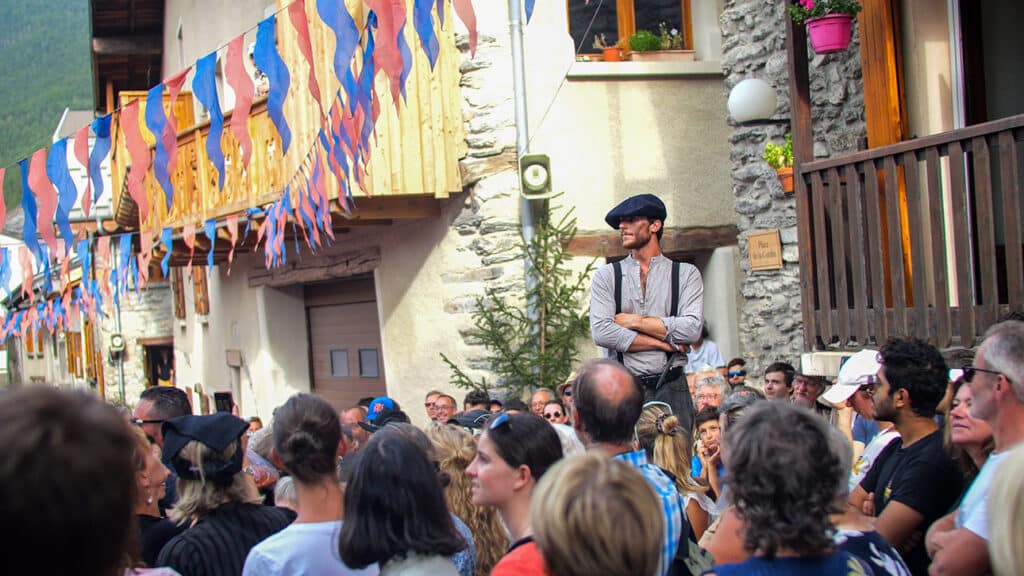
From that day on, the second-hand sacristan was never seen again, for he was the false Capuchin who tried to murder the parish priest in order to rob him. He was the leader of the Fourteen Hats, who was buried in the priest's place. When the bandits saw the parish priest alive and well the next day, they were stunned. Only then did they understand what had happened; they were distraught and frightened. On the other hand, the sacristan's disappearance was a clue for the carabinieri, who gradually managed to capture the entire gang.
Thus ended the nightmare created by the fourteen Great Hats, to the great relief of the excellent and hospitable people of Bramans.
Since then, you can travel its paths without fear of bandits.
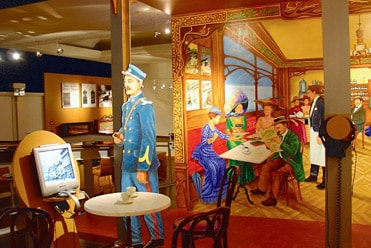
Le Museobar
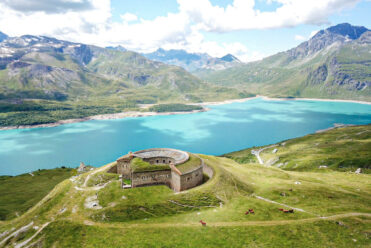
Culture and heritage in Val Cenis
